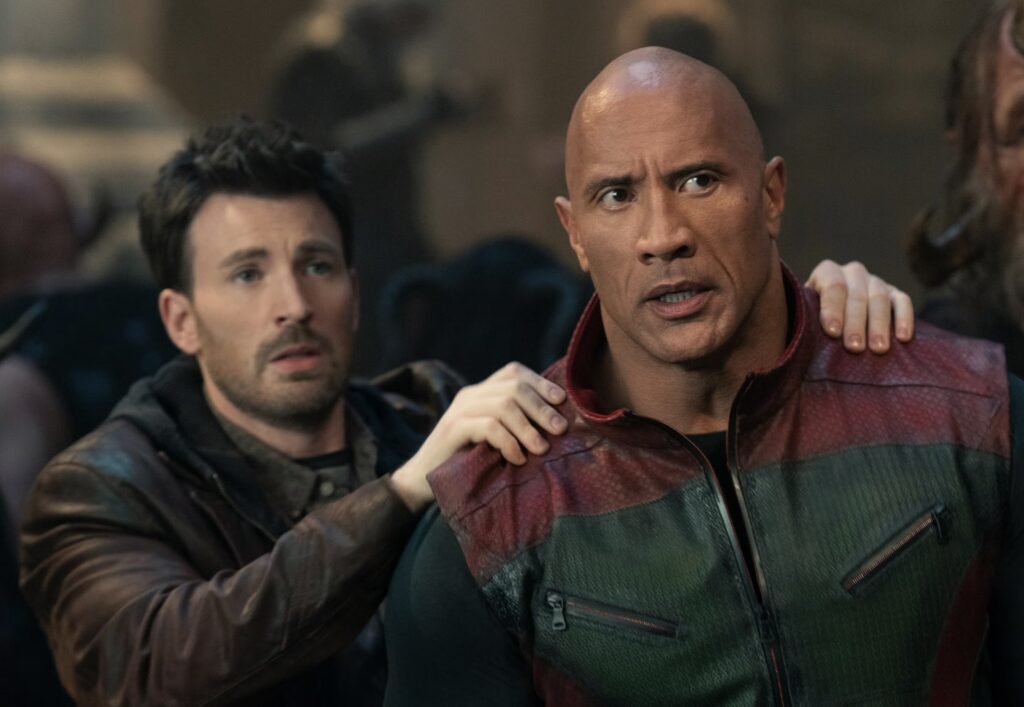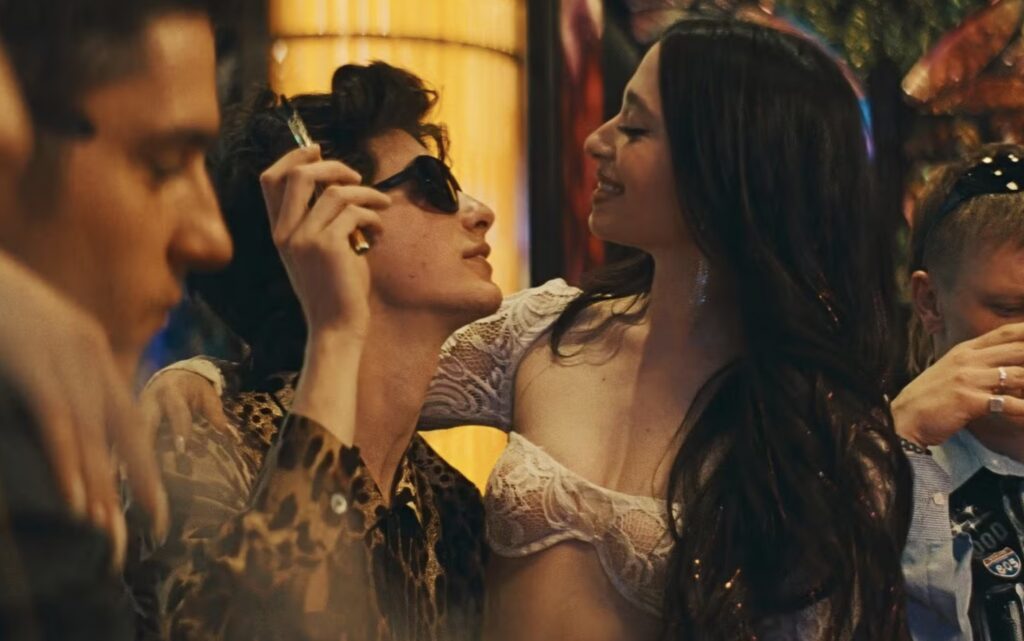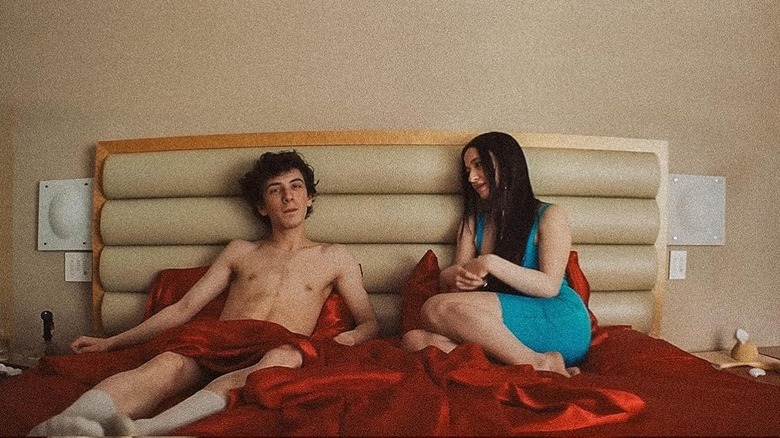
A lot of people are going to look at Red One’s box office this weekend and categorize it as a failure.
The film cost 250 million dollars and made only 34 million this weekend.
But whether this movie is a failure or not depends on your perspective. As a movie that needs to make money, yes, it is a failure.
But as a screenplay, this script is beyond a success. That’s because IT GOT MADE. This is something a lot of screenwriters either don’t know or forget. Sure, we all want the glory of that box office hit. But when only 1 of every 10 purchased screenplays/concepts makes it to the big screen, you’ve won the lottery JUST BY GETTING MADE.
So the question to screenwriters shouldn’t be, why did this fail? It should be, why did this succeed? It succeeded because it was a big concept that came at the genre in a fresh way, utilizing an “IP Adjacent” strategy.
Let’s break that down.
The big concept is Santa’s been kidnapped and they hire a real life secret service agent tracker to rescue him. The fresh angle is that they position it like a superhero movie, complete with superheroes Dwayne Johnson and Chris Evans. And since they don’t have actual IP (Marvel, Star Wars, etc.) they lean into Christmas IP (characters like Santa Claus and Krampus).
I don’t want to undersell the value of the CIA tracker angle. I read a lot of “Santa Claus gets kidnapped” scripts. More than you could ever imagine. But no one’s ever come to me with that tracker angle. It’s almost always some little kid and one of the reindeer who have to rescue Santa. By turning the protagonists into Jason Bourne and Batman, it gave the overused concept a fresh feel.
If I were a producer, I would’ve bought this pitch 10 out of 10 times in the room. It’s not Marvel but what is? Marvel isn’t even Marvel anymore so you need to take chances on projects. This project had way more good going for it than bad so I don’t fault the movie at all.
The only change I might’ve made was to go with more of a comedic actor in the Chris Evans role. Chris Evans and The Rock often play the same role in movies. They’re both big tough guys. You probably needed more contrast there. But, with that said, the two looked to have pretty good chemistry.
Speaking of becoming a screenwriting success, it’s important to remember that, for most writers, success is not a linear journey. It may appear that way to anyone who came into the business between the years of 1998-2008. You get that big sale, you get the follow-up story in the trades, and your career is launched “overnight.”
But, more often than not, your ascension is a series of smaller less visible steps. Look no further than Scott Beck and Bryan Woods. The two were unknown screenwriters when they wrote A Quiet Place. Even after selling it, nobody talked about the film until it became an unexpected hit. Only then did their profiles rise, allowing them to direct their first film in the sci-fi thriller, “65.”
That movie didn’t have enough money to live up to its high concept premise but it established the two as legitimate writer-directors and now they just came out with Heretic, which has a 92% Rotten Tomatoes score and has banked a respectable 20 million dollars in 10 days.
Once again, this all started because they wrote a really good high-concept script in A Quiet Place. What’s the theme today? High concept. Red One is a huge concept. A Quiet Place was a high concept. It’s not that you have to write high concept every time out. But, as you can see, if you want to be the 1 out of 10 purchased projects that actually gets made, high-concept material is often the factor that gets you past the finish line.
The other theme of the day is IP-adjacent subject matter. You don’t have the rights to gigantic IP. So you have to look in the public domain and get creative. Red One may not technically be IP. But it feels like IP. Because who doesn’t know Santa Claus?

Next weekend, we get more IP-adjacent subject matter in Gladiator 2, which is projected to dominate the box office. A big reason for that domination is the Roman Empire. Who hasn’t heard of the Roman Empire? So by setting a movie there, you get the advantages of IP without actually having to foot the bill for IP. These are the things that smart screenwriters think about. Any one of you could write a script about Caesar or Tiberius or Caligula or Constantine tomorrow and wouldn’t have to pay a dime for the rights.
You can still write smaller scripts but, if you do, you have to be a lot more strategic about it. If you want Hollywood people to buy your script, you probably need to write in the horror, thriller, or sci-fi genre, and keep the budget under 5 million (which means a somewhat contained story). If you want to write character-driven material, you have to have a great main character (Nightcrawler, Promising Young Woman, The Whale, Wolf of Wall Street).
But let me be very clear about something: The lower the concept, the more it becomes a writer-director project. I loved Anora. It will probably be my favorite movie of the year. But if it came to me as a script? To buy? I’m not buying it. It’s so character-driven, non-traditional, and execution-dependent that I wouldn’t know what to do with it once I got it. That kind of script needs a writer-director.
Of course, nobody knows anything. All of this can change tomorrow. Someone could sell something that doesn’t fit any Hollywood formula. Heck, that just happened. That big 2 million dollar spec that sold bucked every trend in the business by being a character-driven love story. So you could just go by the strategy of: Write whatever movie you would want to see (the Jordan Peele method of writing). But if you’ve been in this racket for a long time, I find it silly not to strategize what script you’re going to write next. Writing a script always takes longer than you think it’s going to take and one of the biggest mistakes writers make is starting a script without thinking about how easy it will be to sell when it’s finished. In other words, strategize however you want to strategize. As long as you strategize. :)
What’d you see this week? Anything good?

There is an ebb and a flow to what I obsess over in the screenwriting space. Sometimes I’m obsessed with high concepts. Sometimes I’m obsessed with a great opening page. Sometimes I’m obsessed with second acts.
But as time has passed, there is one obsession that seems to keep coming back to the forefront again and again. Wanna take a guess what it is? While you rack your brain, let me explain WHY I continue to be obsessed with this particular element. It’s because if you are good at this thing, it is one of (if not the) biggest indicator that you are good at writing screenplays.
Wanna know what it is?
Scene writing.
I know, I know. I talk about this all the time. But that’s the point! It’s so important that I keep coming back to it.
The reason it got triggered this time is that I was doing a script consultation while I was in a pretty lousy mood. In script-reading parlance, I was a “tough crowd.” Since my baseline is “tough crowd,” this made me an extremely tough crowd. Despite that, I was pulled into this screenplay immediately. I can’t give you the opening scene for privacy reasons but it amounted to a woman letting a stranger in need of help into her home and the stranger being suspicious. In other words, we know bad things are coming. And if the reader knows bad things are coming, they have no choice but to keep reading.
But if that’s all the scene is, it won’t be enough. You have to build, you have to create conflict, you have to deliver a satisfying resolution, maybe do something unexpected along the way. That’s writing. You’re TELLING A STORY in that scene. Which seems like such an obvious point to make but it should shock you when I tell you I read entire screenplays (a lot of them!) that don’t have a single entertaining scene within them. They’re all scene fragments or exposition or setup for later scenes or a bunch of crap the writer stuffs into the scene to get it out of the way.
Let me make this clear: If you are incapable of consistently writing compelling scenes, you will never advance anywhere as a screenwriter.
In other words, stop focusing on the bigger picture of finishing your scripts if you haven’t even been able to write good scenes yet. How do you know you’ve written a good scene? The reader brings it up! “Oh man. The house invasion where they try and tie Anora up (in the movie, “Anora”). That was a crazy scene!”
Now… does the ability to write a good scene mean the writer will write a good script? Of course not. This is because someone can get lucky. Which I see happen all the time. See, there are these things called “dramatic situations.” These are naturally compelling situations that effortlessly keep a reader’s interest. In the example I used above, a potentially dangerous man alone with a woman in her home… that’s a dramatic situation. Conversely, if those same two people, under the same pretense (he’s a dangerous person), started talking in the middle of Times Square? The scene would lose much of its dramatic punch.
What I’ve learned is that writers can stumble into dramatic situations accidentally. There was never a plan to find the situation. They just got lucky and picked one that was naturally dramatic. Therefore, when you have that writer extrapolate that scene into an entire script, they will rarely, if ever, include a dramatic situation again. And even if they do, it *too* will be an accident.
Once you become a writer who has accumulated enough experience that you have a breadth of dramatic situations to choose from, you will increase the number of dramatically compelling scenes you write, which, in turn, vastly improves the chances that the totality of your script will be good.
Now, does it GUARANTEE it will be good? No. Because writing a series of individually compelling scenes does not equate to telling a story. The challenge with writing full scripts is connecting those scenes together in a story that, like the scenes themselves, builds, then conflicts, then resolves.
The reason that’s so challenging is that a script is long. And there’s a pacing element to all of this. A storyteller needs to know when they’ve been on a road for too long. They must know when to deviate onto a new road – maybe smaller, maybe bigger – that has new things to see, new things to throw at the driver. Learning how to bob and weave and twist and turn to always stay on the road that best maximizes your story takes a lot of trial and error.
Once you become good at scene-writing, you want to become good at SEQUENCE WRITING. That may sound fancy but it isn’t. It’s just the next measurement up from scene-writing. If scene-writing is a teaspoon, sequence writing is a tablespoon (and a script is the entire bowl).
It just means that several scenes will be strung together to create their own story. Let’s say a married couple trying to repair their marriage is having dinner at a restaurant. The act of driving to the restaurant, getting their table, ordering their food, and then eating – that’s technically four scenes. But it’s one sequence that all relates to the same thing (going out for dinner).
Do you need to write four individual dramatically compelling scenes there IN ADDITION TO a dramatically compelling sequence? No, you do not. I would encourage you to try. But I get that sometimes, due to the nature of the script, it doesn’t make sense. Maybe this is a section of the script that needs to move quickly. In that case, staying too long in a couple of these scenes is going to hurt the pacing.
However, let me make something very clear. If you are not including a dramatic situation in each individual scene, you BETTER be creating a dramatic situation with the sequence those scenes reside in. Cause if you’re doing neither, I GUARANTEE you the reader will not make it past that sequence. They WILL stop reading.
The simplest way to create dramatic situations is to introduce a problem to your character, either one that requires a physical solution or a conversational one, try to have them solve it, but put things in the way that make solving the problem uncertain. That’s a key word: UNCERTAIN. If we are uncertain that they will be able to solve the problem, we need to keep reading. But if we’re REASONABLY CERTAIN they’ll figure it out, that scene or sequence loses any trace of drama and we don’t need to keep reading to know what happens.
The best scene in the movie Civil War operates under this formula. A rogue soldier is casually murdering people. He has two of our protagonists with him. The rest of our protagonists have the problem: Their co-workers are about to be assassinated by this dude. They need to convince him not to. Their attempts to persuade him and the uncertainty of his response are what make the scene a dramatic tour de force.
This is NOT the only formula for creating dramatic situations. Just the most used one. In fact, I would love it if you guys shared some of your favorite go-to dramatic situations you pull from when writing your scenes. Together, maybe we can come up with a big enough list that nobody from this site will ever write a boring scene again. :)
If you mention this article, I will give you $100 off a screenplay consultation and $5 off a logline consultation. E-mail me at carsonreeves1@gmail.com if you’re interested!

Unfortunately, I’m traveling this week, which is going to make it hard to post. But I didn’t want to leave you high and dry so I thought I’d quickly share my thoughts on Alfonso Cuarón’s high-production foray into TV, Disclaimer.
Cuarón likes to bounce back (Roma) and forth (Gravity) between low and high budget faire. He is the filmmaker’s filmmaker, the kind of guy you would imagine drags a Panovision camera over to the local coffee shop JUST IN CASE he sees a magical shot he could use in his next movie.
So it was shocking that Cuarón finally made the plunge into television. These film purists haaaaate TV. They think it’s evil. They think it latches onto your inner intestines and slowly nibbles away until there’s nothing left of you but a shell. Cuarón making a TV show is only one director removed from Christopher Nolan doing TV. Considering Nolan would rather fry his eyes inside an industrial sized Mumbai frier before doing TV, that’s a big deal.
Disclaimer is about a very successful journalist, Catherine, who, one day, receives a bunch of photos of her younger self in very sexual positions. Over the course of the story, we learn that, 20 years ago, while she was on holiday with her husband and son, she engaged in a secret intense sexual fling with a young man on the trip.
The next day, due to her negligence, her son ended up on an inflatable boat way out in the water (her husband had to return home early so he wasn’t there). Her lover swam out to save the boy but drowned in the process. Catherine was happy because it meant she could completely bury what happened. There’d be no trace of any relationship.

However, the boy’s parents not only found out what happened, the mother wrote a book about it which the father later published (after the wife’s death). The book focuses on just how awful this woman is. With the book and pictures out there, our dirty debutante must try and clear up the mess before her reputation is ruined forever.
I don’t think I’ve ever seen a show that wanted to be seen as genius more than this one. Even if we’re only going off the cinematography, this is true. 99.9% of the shots are at magic hour. That may seem trivial but if you’re only shooting at magic hour, that means you are spending a lot of time during the day NOT SHOOTING. Which is expensive. That alone tells you how great Cuarón wanted this to be.
The problem is the same problem with all these “tweeners.” Which is that we’re dealing with a half-movie half-show. It never becomes one or the other. In refusing to do so, we’re never sure what to make of what we’re watching. It really does feel like an odd beast.
But I think the real problem is the characters. There wasn’t one character that worked. Catherine, the lead, was too passive and weak. Stephen, the father of the kid who was killed, was too weird. The guy wore his dead wife’s too-small pink sweater everywhere, like some deranged, but more accessible, version of Buffalo Bill. Catherine’s husband was so spineless you were begging for his scenes to end the second he showed up on screen. Their son was so melodramatic (drug addict, always mad) he didn’t even need to be in the show since we ALWAYS KNEW EXACTLY WHAT HE WAS GOING TO DO.
The only part of the series that kind of worked were the flashbacks to Young Catherine and her lover. Both those actors were strong. They had great chemistry. There was actual tension when they were onscreen. This is the rare instance when I admit that the flashbacks in a story actually helped it. But that’s at least partly due to the fact that everything in the present was so overwrought, making you beg to be anywhere but there.
I can’t believe I made it through the whole series. (spoilers) To be honest, the only reason I kept going was because I heard there was a whopper of a twist. And, to the show’s credit, the twist is pretty shocking. Even more shocking is that we wonder if the final development was the truth… or a lie. But could it make up for 7 episodes so determined to win awards that I wouldn’t be surprised if Cuarón’s crew submitted the series not just for this year’s Emmy’s, but for every Emmy’s through 2034? It couldn’t.
It’s not a bad show. It’s just not as good as it wants to be. And, sometimes, that’s worse than being a bad show.
What did you think?
We might be looking at 2024’s Best Picture winner
Genre: Drama/Thriller
Premise: An exotic dancer marries the son of one of Russia’s richest men, creating chaos within the family, which is determined to annul the marriage.
About: Sean Baker’s Palme D’Or winning film, Anora, is already his biggest box office hit, taking in 7.5 million dollars so far. To people who only track the box office of movies with 200 million dollar advertising campaigns, that may not seem like much. But Baker’s movies have no money for advertising and are dependent on their quality alone (unlike the Marvel universe) and therefore, 7.5 million dollars WITH MOMENTUM to make a lot more is amazing.
Writer: Sean Baker
Details: 2 hours and 20 minutes

Sean Baker may be my favorite director at the moment.
With his only competition being the Safdies and the Daniels, Baker is number one in the books at bringing ENERGY to indie movies.
Every other indie movie is slow and lethargic. You watch a Sean Baker movie and you feel like you’ve just watched an Avengers movie. They have the same kind of energy. Dare I say, Baker’s Anora has MORE energy than any of the last five Marvel films.
That may be more of a commentary on Marvel than Baker but regardless this guy is a master at making every moment in his movie watchable. I can’t overstate that. This movie was 2 hours and 20 minutes long and there was never a moment in the film where my concentration strayed.
That NEVER happens to me these days. I’m always straying. Because writers (and directors) don’t know how to keep my interest. The better ones can create great scenes every once in a while and keep me engaged in the meantime. But to make EVERY moment compelling?? I don’t experience that anymore except for Baker and maybe the Safdies.
Oh, and by the way!? Baker may be the best casting director in the world. Let me give you a concrete example. The Pitt-Clooney movie Wolfs on Apple contained a very similar character to the character of Ivan in this movie (he’s known as “Kid” in Wolfs and he’s supposed to be this young wild character). The actor who played Kid in that film was below-average to weak. Even annoying at times. He wasn’t exciting nor was he really watchable in any way, which hurt the film because he had a giant part.
But the actor who played Ivan in Anora? I don’t think I’ve seen a young actor this charismatic in two decades. And Baker found him. And don’t even get me started on the actress who played Anora, Mikey Madison. She’s amazing. The guy seems to have an incredible instinct for this stuff.
I wanted to get the directing praise out of the way first because I want to use the rest of the review to talk about the unique screenplay here.
Note: This script’s narrative moves in an unpredictable way so the very nature of reading this synopsis is a spoiler. I suggest you see the movie first, if possible.
Anora is a 23 year old exotic dancer who works in a Jersey strip club. One day, a 21 year old boisterous Russian kid comes in to get a lap dance, chooses Anora, and afterwards, he gets her number. The next day he pays her to come over to his sick crib and have sex.
At first, Anora is all about the money. But it’s clear she’s starting to like Ivan. Ivan proposes hiring Anora for the week and she accepts. They have sex, party, play video games. Then they go on an impromptu Vegas trip and, while there, mostly because he’s wasted and lives in the moment, Ivan proposes to Anora. She says yes and they get married that night!

They go back to Jersey and that’s when Ivan’s handler, Toros, shows up with two thugs, Garnick and Igor. We learn that Ivan’s Russian parents are extremely rich and that there is no f*cking way they’re letting their son marry an American stripper. But the parents are back in Russia. So Toros must get this marriage annulled immediately or he’s in a heap of trouble.
There’s only one problem: Ivan runs away!
He just leaves the house! He even leaves his wife there! Toros has no choice but to call the parents and tell them what happened. Furious, they immediately get on a plane to Jersey. Anora, who’s blindly convinced that things are still going to work out, is now forced to team up with Toros and the thugs to go find her husband before the damn parents arrive.
(Ending spoilers follow) It’s an all-night excursion as Ivan gets plastered and jumps from nightclub to nightclub, party to party, with our pursuers always a step behind. When they finally catch up to Ivan, Anora is expecting him to make things right. But a sobered-up Ivan shrugs his shoulders in defeat and says, sure, let’s get it annulled.
Betrayed, Anora spirals into a mental tailspin. The only person by her side is Igor, the kind-hearted, but dim-witted, thug who, in his own quiet way, has been there through it all. After the annulment is finalized, Igor is the one tasked with bringing her back to her sad Jersey life. But in those final moments together, as she reflects on everything that’s happened, Anora begins to wonder if she’s missed something—or someone—who’s been right in front of her all along.

There are so SO many good things about this script I don’t know where to start. Baker is a low-key great writer.
Let’s start somewhere random – the villain. Because we haven’t talked about villains in a while and this is a great example of how to write a villain with logic. Most writers start off knowing their villains are bad and then spend the rest of the script figuring out WHY they’re bad. Whereas, with Toros, Baker started with WHY Toros was “bad” and then let the villainy aspects of the character emerge from there.
This is how you create characters with truth. You don’t force aspects onto them. You figure out their motivation and let them act in accordance with that motivation. Toros is the villain to Anora and Ivan here. They like each other. They’re married. He wants to destroy that. But Toros has a very good reason for wanting to destroy that. He’s been hired specifically by Ivan’s parents to watch him and make sure he doesn’t do anything stupid while in America. So if Ivan does anything remotely stupid, it is Toros who is going to be in trouble. And not regular trouble. Angry Russian oligarch trouble, which is the kind of trouble that could end with you six feet under. So OF COURSE Toros is doing this stuff.
There’s this blink-and-you-miss-it moment late in the screenplay when they go to the Jersey courthouse to get the marriage annulled and learn that they can’t get it annulled here. It must be in Vegas. Toros is stumbling back to the car outside saying, to no one in particular, “I didn’t know this! Everyone can see that right? I was not told that they got married in Vegas. This is not my fault!”
You can see the fear in Toros’s eyes in that moment and understand why he is so adamant about achieving his goal.
Which brings me to another aspect of the screenplay that I loved, which is that every character here has a story. There is no character who is overlooked. For example, any other writer writing these two thugs would’ve seen them as afterthoughts. Baker gives Igor this under-the-radar crush storyline on Anora. And Garnick has this hilarious storyline where he deals with the deteriorating effects of a head injury dished out by Anora early on.
But the coolest thing about this screenplay is that it reboots twice. Rebooting is the act of telling one story but then, at some point, abandoning that story and telling another one. It’s a high-risk high-reward tool and should not be used by the faint-hearted. Because it rarely works.
Usually, people come to a movie to see THAT MOVIE. So, when you, all of a sudden, tell them they’re now going to watch another movie, they feel hoodwinked.
Let me try and explain this. You’ve all seen Pretty Woman, right? Pretty Woman is about a businessman who hires a prostitute to be his girlfriend for the week he’s in town. When we went to see that movie, THAT’S THE MOVIE WE SAW. We didn’t see a movie about a businessman who hired a prostitute to be his girlfriend for the week and then, midway through the movie, he flew back to his hometown and dealt with family issues there. However, if he had, that would’ve been a script reboot.
In Anora, the script starts out as a Pretty Woman update. Ivan hires Anora to be his girlfriend for the week. But he takes it a step further and marries her. The bad guys come in and say you need to get an annulment. We’re thinking this is a 2024 version of Romeo and Juliet. That the movie is going to be about them resisting their evil older overlords and that love will conquer all.
But the script reboots when Ivan runs away. That doesn’t fit any of the criteria of the story we have been promised. They must now go find Ivan. And that becomes the entire middle of the movie. It is a reboot because it is a completely different movie. It’s basically a chase movie now. It certainly isn’t a movie about Ivan and Anora falling in love because Ivan’s barely in the story anymore.
That’s a giant risky move as a screenwriter and it worked.
But what shocked me is that Baker had the balls to reboot the script AGAIN. Technically, once they get the annulment, the movie should be over! Think about it. We’ve achieved the goal. What else is there to do?
Well, Baker has been stealthily setting up this low-key romance (mainly one-way romance) between Igor and Anora. So he creates this final storyline where Igor takes Anora back home. It’s a good 25 minute story that is completely different from everything that’s come before it. Which is why it’s a reboot.

Typically, when you end a storyline (in this case, getting the marriage annulled), all the air goes out of the balloon. So if you try and start a new storyline, you’re asking the reader to stick with you while you blow all that air into a new balloon. And most readers just don’t have the patience for that. Yet here, it works because Baker did such a good job setting it up that we want to see how this relationship is going to be resolved.
There’s a lot more to this movie than what I’ve covered but this should give you an idea of why I love this movie so much and why I think it will probably win Best Picture.
[ ] What the hell did I just read?
[ ] wasn’t for me
[ ] worth the read
[x] impressive
[ ] genius
What I learned: Don’t be afraid to incorporate big-budget screenplay tactics into small-budget indie-type scripts. I loved that Baker created this 15 hour ticking time bomb in the second act. They needed to find Ivan and get the marriage annulled by the time his parents’ plane landed. That urgency helped move that second act along like a bullet train.
And a deeper dive into how a script sold for 2 million dollars

Note: If you want to read the script I refer to today (Love of Your Life) for more context, ask for it in the comments section. Someone will send it to you. Otherwise, you can check out my review of it (which has a plot synopsis) here.
I was thinking about yesterday’s big script sale and trying to derive meaning from it. It may be a fruitless venture since it’s difficult to deduce anything from a single data point. But 2 million dollars for a script in a landscape that barely likes to write six-figure checks is worth looking into.
The first thing I noticed is that this script was not a previously set up deal. Sometimes what happens is a studio will have a meeting with a writer and/or a producer they’re working with and say, “We want this kind of movie. We can’t put the money up front. But we basically promise that if you deliver what we want, we’ll buy it on the back end.”
These types of script sales are deceiving because they don’t reflect what the industry is looking for. They reflect what one specific person at a studio is looking for. Love of Your Life was more of a traditional spec sale in that it was sent out on the town and everybody liked it so they started bidding on it.
The reason that matters is that it means the script sold on merit alone. Which means we know the writing is good. Back in the old days, a script went out on the town and, because lines of communication were still in the stone ages, studios would read the first act and, if they liked it, start bidding in order to beat out the other studios, who they assumed were bidding as well. Hence, a lot of scripts that became garbage in act 2 and 3 were purchased. And I mean A LOT.
These days, studios don’t make that mistake. They will read the entire script. They will pass the script on to other people in the studio and have them read it. They will get their opinions. They will ask for honesty. If they’re going to pay for anything, they want to make sure it’s a quality screenplay. That was the case with Love of Your Life. It won over everyone who read it.
That’s the first big lesson to come out of this sale and it’s a lesson I’ve been preaching since I started this website: If you write something good, good things will happen.
But, of course, that advice reads hollow since every screenwriter who finishes a screenplay believes they’ve written something good. But how do we know if something we’ve written is actually good? The only true way to know is if you get at least ten people to read it and give you their opinion. One person’s opinion can be a fluke. So can two, three, even four people, if they’re not the right audience for your script. Case in point, a few of you have read this script and thought it was weak. Had you been the primary studio reader in charge of evaluating scripts, the studio would’ve passed.
But once you get up to 10 people, it’s hard not to see a trend in the responses. You’ll know if you’ve written something bad, good, or something that’s not quite there yet but has the potential to be good with more rewrites.
Unfortunately, that doesn’t help you when you BEGIN writing your screenplay. So, what are some specific ways in which we can write something good? Funny enough, after this script sold, my answer to that question changed. Well, maybe not changed. But it reminded me that the bells and whistles of a spec script (sexy concept, GSU, bankable genre) aren’t as important as what’s underneath the hood.
Which leads me to the premise of today’s article.
Every genre is a drama in disguise.
Therefore, if you want to write a good script in any genre, you must first understand the basic tenets of dramatic writing. Dare I say, you should even write a drama. Just so you understand how to entertain people without any tricks. With the drama genre, you entertain readers through the simple act of character exploration.
With that in mind, the number one thing you want to do is anchor your screenplay with someone we want to root for. I would even say, 90% of the time, you want to anchor it with someone we like. Because the second we like someone, we’re willing to go with that person wherever they take us.
And you don’t have to reinvent the wheel to achieve this. The main character in Love of Your Life, Maya, is just a nice person. Not to mention, she’s an ER doctor. So her job is to literally save people. It’s hard not to like someone like that.
Imagine if screenwriter Julia Cox, instead of going the ER nurse route, made her main character a selfish drug addict. I want you to sit in that for a moment. Consider how differently you would feel about this character (a character built around negativity). It would be much harder for you to instantly start rooting for her.
Now, ironically, Maya becomes more prickly as the story goes on. But it works because it’s a result of progressive character development. She was a happy in-love person. Something terrible happened to her. So we understand why she’s shifted from the positive end of the spectrum to the negative.
This leads to the next dramatic lesson of this article, which is that you can always do things to STRENGTHEN THE BOND between the reader and the main character. The stronger you make that bond, the more connected we are to that character. Seeing a character lose the love of their life takes a character we already like and makes us care for them EVEN MORE. That’s because we sympathize with them. And for anybody who’s lost a loved one, we empathize with them. These are two incredibly strong tools that, along with likability, make the bond between us and the hero elevate to nuclear levels.
But Cox takes that development to an even HIGHER level. Let me explain. Normally, you don’t have time to show the bond between two characters in a screenplay where one is going to die. Scripts move too fast. This forces the writer to kill off someone we barely know 10-15 pages into the script. In some cases, the script will even start right after a death.
Note how different the effect of death is on the reader if it’s done before the screenplay starts versus watching two people fall in love for 20 pages. That’s what Cox opted to do. So this wasn’t some random person our protagonist loved. This was a character WE OURSELVES GREW TO KNOW AND LIKE. To see Maya lose him hurt us almost as much as it hurt her. Which means that now we are connected to Maya EVEN MORE. We already like her. We sympathize and empathize with her. But by allowing us to get to know the character before they die, we have so much more attachment to Maya and what she’s going through.
Moving on, any good dramatic script takes their protagonist through a range of experiences. This makes the character stereo as opposed to mono. We like contrast in characters. We like depth. But there’s a way to do it and a way not to do it. Cox shows you the right way. First establish who Maya is (good, positive, happy) and then throw something devastating at her. This takes her to a dark place where she lives in the opposite of the above emotions.
The way NOT to do this, which I see all the time, is to smash all these conflicting emotions into the protagonist right away. They’re happy one second. They’re angry for no reason a second later. They’re cool as a cucumber. Then they’re a bull in a china shop. This may create contrast within your character, which technically makes them “complex,” but the chaotic nature of it leaves readers confused rather than intrigued.
From that point on, Love of Your Life is driven by two dramatic factors. And these are the factors that will power any dramatic screenplay. One: resolution from within – Your hero must resolve that which is broken inside of them. Two: relationship resolution – Your hero must resolve all unresolved relationships in the story.
Note how I’m not saying anything about plot. That’s because plotting is not as important in a dramatic screenplay. The “plot” is essentially the main character’s arc. We’re there to see them resolve their brokenness. This is why it’s so important to establish the likability and sympathy early on. Because the less we like the hero and the less with sympathize with the hero, the less we’ll care about them resolving their internal issue. On the flip side, if you create amazing likability and sympathy (and, in this case, empathy), then we’re with you hook, line, and sinker. We’ll be dying to see your hero resolve their issue (in Maya’s case, to get past her grief and move on from the death of her husband).
However, when it comes to the drama genre, a single internal arc for your protagonist isn’t enough to power the entire screenplay. Remember, you often don’t have a strong plot in these dramas. So, you need more.
You get that from UNRESOLVED RELATIONSHIPS between your hero and other characters. The cool thing about this aspect of drama is that you can add as many of these unresolved relationships as you want. For Love of Your Life, the two main unresolved relationships are her best friend, Jason, who she ran away from the second her husband died. And Ruth, the mother of her dead husband, who she also abandoned.
There is also another man Maya falls in love with that acts as a bridge between her husband’s death and those later character resolutions. Any interaction with another character that contains an unresolved element counts. So, in this case, the unresolved element is whether the two will remain casual lovers or become official.
The point is, we will keep turning the pages to see how those relationships get resolved.
It’s important to note that relationship exploration is not just about checking boxes. You still have to be creative in the way you explore these resolutions. For example, the conclusion of the Jason relationship could’ve gone in a much more conservative direction. It could’ve just been the two reestablishing their friendship.
But, instead, it veers into the potentially dangerous territory of a romantic relationship. There’s so much baggage here and these two both loved her husband so much, that getting together probably isn’t the best idea. But it’s that creativity in the exploration of the storyline that makes this relationship exciting to read. If it was a nuts and bolts resolution, it wouldn’t have been as compelling.
It’s a funny thing, screenwriting. Cause when you break it down – when you look at all of the individual components that make a script work – it seems obvious. But, of course, it never is. Coming up with this stuff requires taking a lot of risks, getting a lot of feedback, and receiving a lot of rewriting based on that feedback.
But I stand by what I said. If you can make a script work just on drama and character, you are so much better equipped to go into the sexier genres of action, horror, thriller, and sci-fi because those scripts will always take you to moments where you don’t have any fireworks to light to keep the reader invested. In those quieter moments, it is your dramatic writing skills that will get you through. So, it wouldn’t be the worst idea to write your own “Love of Your Life.” If only to sharpen your dramatic writing skills. :)

